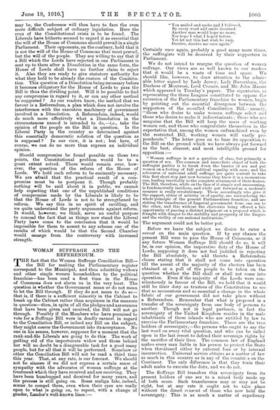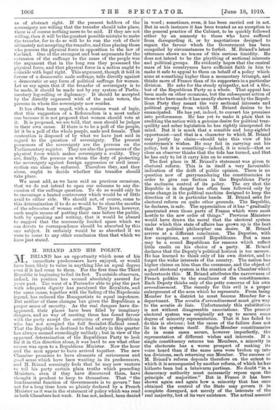WOMAN SUFFRAGE AND THE REFERENDUM.
THE fact that the Woman Suffrage Conciliation Bill— the Bill for making the Parliamentary register correspond to the Municipal, and thus admitting widows and other single women householders to the political franchise—has been read a first time in the House of Commons does not alarm us in the very least. The question is whether the Government mean or do not mean to let the Bill through. If they do not mean to do so— that is, if there is a sufficient minority in the Cabinet to break up the Cabinet rather than acquiesce in the measure in question—then, in spite of all the pledges and assurances that have been given and received, the Bill will not go through. Possibly if the Members who have promised to vote for a Suffrage Bill were in deadly earnest in regard to the Conciliation Bill, or indeed. any Bill on the subject, they might coerce the Government into its acceptance. No one in his senses, however, supposes for a moment that the rank-and-file Liberals are going to do this The work of getting rid of the importunate widow and those behind her will no doubt be a disagreeable task for a good many people, but for all that it will be performed. Somehow or other the Conciliation Bill will not be read a third time this year. That, at any rate, is our forecast. We should not be sincere if we did not express a certain sense of sympathy with the advocates of woman suffrage at the treatment which they have received and are receiving. They have been humbugged and deceived for many years, and the process is still going on. Some malign. fate, indeed, SEMIS _ to compel them, _even, when their eyes arc really open to what is going on, to repeat, with a change of gender, Landoes well-known lines :—
"You smiled and spoke and I believed, By every word and smile deceived. Another man would hope no more, Nor hope I what I hoped before. Yet let not this last wish be vain, Deceive, deceive me once again."
Certainly once again, probably a good many more times, the suffragists will be deceived by their supporters in Parliament.
We do not intend to reargue the question of woman suffrage. Our views are so well known to our readers that it would be a waste of time and space. We should like, however, to draw attention to the admir- able letter signed by Lady Jersey, Lady Haversham, the Duchess of Montrose, Lord Cromer, and Mr. John Massie which appeared in Tuesday's papers. The signatories, as representing the three Leagues constituted to oppose the extension of the Parliamentary franchise to women, begin by pointing out the essential divergence between the supporters of the so-called Conciliation Bill,—namely, " those who desire to make woman suffrage select and those who desire to make it indiscriminate ; those who ara sanguine that the Bill will keep the mass of working women out, and those who congratulate themselves in the expectation that, among the women enfranchised even by the restricted Bill, working women will vastly pre- ponderate." The letter goes on to base its opposition to the Bill on the ground which we have always put forward as the best, clearest, and most intelligible ground for opposition :— " Woman suffrage is not a question of class, but primarily a question of sex. The common and immediate object of both the suffragist parties is to break down the barrier of sex and put women on a footing of full political equality with men ; and the advocates of universal adult suffrage are quite content to take this first short step just now because they know it is a momentous one, leading inevitably to the complete attainment of their desires. The Bill, therefore, while on the face of it simple and unassuming, is fundamentally insidious, and while put forward as a moderate measure is really revolutionary. Those accordingly who give it the support, either of activity or of apathy, are surrendering the whole principle of the present Parliamentary franchise, and are risking the transference of Imperial government from one sex to the other, and this without the electorate being offered a fair opportunity of passing a distinct judgment on a proposal which is fraught with danger to the stability and prosperity of the Empire and the virility of our national institutions."
The argument could not be better put.
Before we leave the subject we desire to enter a caveat on the main question. If by any chance the present Bill were to pass the House of Commons, or if any future Woman Suffrage Bill should do so, it will be, in our opinion, the imperative duty of the House of Lords, supposing it does not feel justified. in rejecting the Bill absolutely, to add thereto a Referendum clause stating that it shall not come into operation till the assent of the majority of the electors has been obtained at a poll of the people to be taken on the question whether the Bill shall or shall not come into operation. Even if the majority of the Lords were con- scientiously in favour of the Bill, we hold that it would still be their duty as trustees of the Constitution to see that so momentous and so essential a change in the whole fabric of our government did. not take place without a Referendum. Remember that what is proposed is a transfer of the sovereignty from one body of persons to another. Though not in legal parlance, in fact the sovereignty of the United Kingdom resides in the male inhabitants of these islands who are entitled by law to exercise the Parliamentary franchise. These are the true holders of sovereignty,—the persons who ought to say the last word. on every vital question, and who can be called. upon in the last resort to defend their sovereign rights by the sacrifice of their lives. The common law of England makes every man liable in his person to protect the State when threatened either by external foes or by internal insurrection. Universal service obtains as a matter of law as much in this country as in any of the countri -s on the Continent. The only difference is that they train their adult males to execute the duty, and we do not.
The Suffrage Bill transfers this sovereignty from its present holders of one sex to a mixed body made up of both sexes. Such transference may or may not be right, but at any rate it • ought not to take place without the direct ccnsent of- those who now hold the sovereignty. This is as much a matter of expediency as of abstract right. If the present holders of the sovereignty are willing that the transfer should take place, there is of course nothing more to be said. If they are not willing, then it will be the greatest possible mistake to make the transfer, for to do so will be to run the risk of their ultimately not accepting the transfer, and thus placing those who possess the physical force in opposition to the law of Cie land. One of the strongest and best arguments for the extension of the suffrage to the mass of the people was the argument that in the long run they possessed the physical force, and that physical force in a nation ought to coincide with legal right. This argument, though it told in favour of a democratic male suffrage, tells directly against a democratic or any form of political suffrage for women. Let us say again that if the transfer of sovereignty is to be made, it should be made not by any system of Parlia- mentary log-rolling or diplomacy. It should be accepted by the directly expressed wish of the male voters, the persons in whom the sovereignty now resides.
It has often been urged, with a curious want of logic, that this suggestion of a Referendum is a most unfair one because it is not proposed that women should vote at it. It is proposed, we are told, that men should be judges in their own cause. If there is to be a poll of the people, let it be a poll of the whole people, male and female. That contention is disposed of by what we have just said in regard to the question of sovereignty. The present possessors of the sovereignty are the persons on the Parliamentary register. They are also the possessors of the physical force which makes sovereignty a reality. They are, finally, the persons on whom the duty of protecting the sovereignty against foreign aggression or civil insur- rection can alone be enforced. Therefore they, and they alone, ought to decide whether the transfer should take place.
We must add, as we have said on previous occasions, that we do not intend to open our columns to any dis- cussion of the suffrage question. To do so would only be to encourage a heated controversy which would be of little avail to either side. We should not, of course, come to this determination if to do so would be to close the mouths of the advocates of woman suffrage. They have, however, such ample means of putting their case before the public, both by speaking and writing, that it would be absurd to suggest that the necessarily limited space which we can devote to correspondence should be absorbed by this one subject. It certainly would be so absorbed if we were to come to any other conclusion than that which we have just stated.











































 Previous page
Previous page